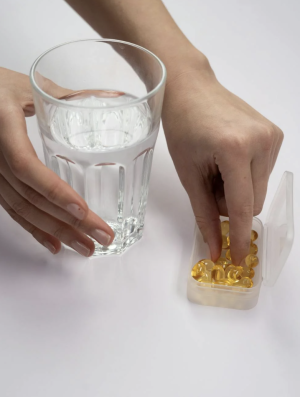Thinking about taking supplements? Here’s what you should know first
By
Veronica E.
- Replies 0
Disclaimer: The information provided in this article is for educational purposes only and is not intended as a substitute for professional medical advice, diagnosis, or treatment. Always consult your physician or other qualified healthcare providers with any questions you may have regarding a medical condition or before making any changes to your health regimen.
From memory boosters and joint support to better sleep and “immune superchargers,” it seems like there’s a supplement for just about everything these days.
For those in their 60s and beyond, it can be tempting to believe that a pill might ease every ache or slow the clock.
But when it comes to supplements, it’s important to separate helpful support from marketing hype.
Here at The GrayVine, we’re all about informed choices.
So before you buy that next bottle, let’s look at what experts say about supplements—what works, what to watch out for, and how to stay safe.

What exactly are supplements?
Supplements are designed to fill in nutritional gaps.
That includes vitamins, minerals, herbs, probiotics, fish oil, and protein powders.
Since the 1990s, the supplement market has exploded—from just a few thousand products to tens of thousands today.
But here’s something many people don’t realize: supplements are not regulated like medications.
Thanks to a 1994 law in the US, manufacturers don’t need to prove that a supplement is effective—or even safe—before selling it.
The FDA usually steps in only if a product causes harm after it hits the market.
Also read: This supplement recall just got more serious—here’s what changed
What’s really in the bottle?
You might assume a label tells the full story, but that’s not always the case.
The FDA doesn’t test supplements before they’re sold, and companies are allowed to make vague claims like “supports heart health” or “boosts immunity” without clinical proof—so long as they include a disclaimer that the statement hasn’t been evaluated by the FDA.
To ensure a supplement actually contains what it says—and is free from harmful contaminants—look for third-party seals from organizations like:
These groups verify quality and accuracy, though they don’t test whether a supplement actually works.
Also read: Don’t make this embarrassing supplement mistake—expert reveals the side effect!
Be cautious with combo supplements
Many products on the shelf contain a long list of botanical extracts, powders, and herbs—all in one pill.
While it might sound convenient, experts warn that mixing too many ingredients can increase the risk of side effects or drug interactions.
Plus, companies don’t always disclose exact doses or the freshness of those ingredients.
The safer choice? Stick to single-ingredient supplements recommended by your doctor.
Also read: Unlock the secrets to a sharper mind with this inexpensive daily supplement
Beware of vague promises
If a product promises to “melt fat,” “boost brainpower,” or “revive your youth,” take it with a grain of salt.
These claims often lack real scientific backing, and companies don’t need to prove them before printing them on a label.
A good rule of thumb: if it sounds too good to be true, it probably is.
Reliable sources like the NIH Office of Dietary Supplements offer science-based information on what may or may not work.
Check those expiration dates
Supplements can lose potency over time—and some, like fish oil, can go bad.
Always check the expiration date before taking anything, and store bottles in a cool, dry place. If it’s expired, toss it.

Also read: Unlock the secret to eternal youth–This supplement destroys “zombie cells”, but heed doctors' surprising caution!
Talk to your doctor first
Most people with a balanced diet don’t need to take a daily multivitamin or extra supplements.
But there are exceptions.
Your doctor might suggest vitamin D, B12, calcium, or iron based on lab results, age, or health conditions.
Always let your doctor know about any supplements you're taking, especially if you’re on prescription medications.
Some combinations can be harmful, even if the supplement is “natural.”
Also read: Are you taking vitamin D at the wrong time? Experts reveal the secret to maximum absorption
Are supplements really necessary?
For most healthy older adults, eating a varied diet is the best way to get the nutrients your body needs.
Thanks to food fortification (like vitamin D in milk), true nutrient deficiencies are relatively rare unless you’re on a restricted diet or have a diagnosed condition.
However, if you are vegan, have absorption issues, or take certain medications, your doctor might recommend specific supplements.
Just remember: pills should fill gaps—not replace whole foods.
Also read: Could taurine—the trendy amino acid in your energy drink—really slow down aging?
A smart supplement checklist
Before adding anything to your routine, ask yourself:
When it comes to supplements, a little caution can go a long way.
By asking the right questions and working with your doctor, you can make choices that truly support your health—without falling for empty promises.
Read next: Stop wasting money: Experts reveal the 5 supplements that won’t help your constipation!

Do you take supplements regularly? Have they helped—or not helped—as expected? We’d love to hear what’s worked for you and what questions you might still have. Share your experience in the comments—your story could help someone else make a safer, smarter choice!
From memory boosters and joint support to better sleep and “immune superchargers,” it seems like there’s a supplement for just about everything these days.
For those in their 60s and beyond, it can be tempting to believe that a pill might ease every ache or slow the clock.
But when it comes to supplements, it’s important to separate helpful support from marketing hype.
Here at The GrayVine, we’re all about informed choices.
So before you buy that next bottle, let’s look at what experts say about supplements—what works, what to watch out for, and how to stay safe.

Supplements can support your health—but knowing what’s safe and effective makes all the difference. Image Source: Pexels / cottonbro studio.
What exactly are supplements?
Supplements are designed to fill in nutritional gaps.
That includes vitamins, minerals, herbs, probiotics, fish oil, and protein powders.
Since the 1990s, the supplement market has exploded—from just a few thousand products to tens of thousands today.
But here’s something many people don’t realize: supplements are not regulated like medications.
Thanks to a 1994 law in the US, manufacturers don’t need to prove that a supplement is effective—or even safe—before selling it.
The FDA usually steps in only if a product causes harm after it hits the market.
Also read: This supplement recall just got more serious—here’s what changed
What’s really in the bottle?
You might assume a label tells the full story, but that’s not always the case.
The FDA doesn’t test supplements before they’re sold, and companies are allowed to make vague claims like “supports heart health” or “boosts immunity” without clinical proof—so long as they include a disclaimer that the statement hasn’t been evaluated by the FDA.
To ensure a supplement actually contains what it says—and is free from harmful contaminants—look for third-party seals from organizations like:
- NSF International
- US Pharmacopeia (USP)
- ConsumerLab.com
These groups verify quality and accuracy, though they don’t test whether a supplement actually works.
Also read: Don’t make this embarrassing supplement mistake—expert reveals the side effect!
Be cautious with combo supplements
Many products on the shelf contain a long list of botanical extracts, powders, and herbs—all in one pill.
While it might sound convenient, experts warn that mixing too many ingredients can increase the risk of side effects or drug interactions.
Plus, companies don’t always disclose exact doses or the freshness of those ingredients.
The safer choice? Stick to single-ingredient supplements recommended by your doctor.
Also read: Unlock the secrets to a sharper mind with this inexpensive daily supplement
Beware of vague promises
If a product promises to “melt fat,” “boost brainpower,” or “revive your youth,” take it with a grain of salt.
These claims often lack real scientific backing, and companies don’t need to prove them before printing them on a label.
A good rule of thumb: if it sounds too good to be true, it probably is.
Reliable sources like the NIH Office of Dietary Supplements offer science-based information on what may or may not work.
Check those expiration dates
Supplements can lose potency over time—and some, like fish oil, can go bad.
Always check the expiration date before taking anything, and store bottles in a cool, dry place. If it’s expired, toss it.

Always take a moment to review your supplements—what’s in them, how they’re stored, and whether they’re still needed. Image Source: Pexels / Mikhail Nilov.
Also read: Unlock the secret to eternal youth–This supplement destroys “zombie cells”, but heed doctors' surprising caution!
Talk to your doctor first
Most people with a balanced diet don’t need to take a daily multivitamin or extra supplements.
But there are exceptions.
Your doctor might suggest vitamin D, B12, calcium, or iron based on lab results, age, or health conditions.
Always let your doctor know about any supplements you're taking, especially if you’re on prescription medications.
Some combinations can be harmful, even if the supplement is “natural.”
Also read: Are you taking vitamin D at the wrong time? Experts reveal the secret to maximum absorption
Are supplements really necessary?
For most healthy older adults, eating a varied diet is the best way to get the nutrients your body needs.
Thanks to food fortification (like vitamin D in milk), true nutrient deficiencies are relatively rare unless you’re on a restricted diet or have a diagnosed condition.
However, if you are vegan, have absorption issues, or take certain medications, your doctor might recommend specific supplements.
Just remember: pills should fill gaps—not replace whole foods.
Also read: Could taurine—the trendy amino acid in your energy drink—really slow down aging?
A smart supplement checklist
Before adding anything to your routine, ask yourself:
- Is this third-party tested? Look for NSF, USP, or ConsumerLab certifications.
- Does it contain only what I need? Avoid “miracle blends” with long ingredient lists.
- Is the label honest? Be skeptical of vague promises.
- Is it fresh? Check expiration dates and storage instructions.
- Have I spoken with my doctor? Always confirm safety and potential interactions.
When it comes to supplements, a little caution can go a long way.
By asking the right questions and working with your doctor, you can make choices that truly support your health—without falling for empty promises.
Read next: Stop wasting money: Experts reveal the 5 supplements that won’t help your constipation!
Key Takeaways
- Supplements in the US are not regulated like medicines, so they can be sold without proof of safety or effectiveness.
- Experts recommend choosing supplements that are independently tested and avoiding products with vague claims or long ingredient lists.
- Most healthy adults don’t need supplements unless directed by a doctor, especially when a balanced diet provides enough nutrients.
- Always talk to your doctor before starting any new supplement—especially if you take medication or manage chronic health conditions.
Do you take supplements regularly? Have they helped—or not helped—as expected? We’d love to hear what’s worked for you and what questions you might still have. Share your experience in the comments—your story could help someone else make a safer, smarter choice!






